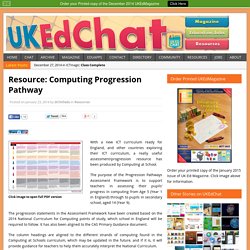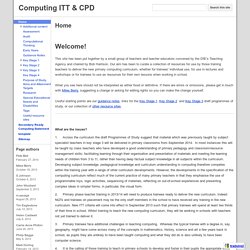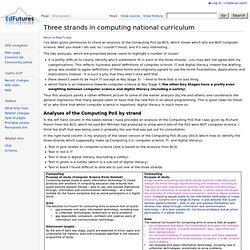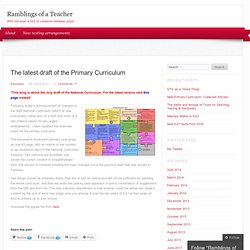

Backlash against computing curriculum misses the point. Computing is an important subject, but it is only one of many that schools have to teach, and few would argue that it is more important than English, maths, or science. But as a high-profile debate continues about the new computing curriculum, due to come into force in September 2014, the ways in which digital technology impacts on other subjects and how they are taught has been ignored. I am worried that a backlash against the new curriculum is distracting us from a much more important set of issues about what children in schools are expected to learn and how we expect them to be taught.
Digital technology has had a radical impact on society. Whether you are a professional sports person, a journalist, an historian or geographer, a musician, a doctor, a chemist, a physicist or a mathematician, what you do and the way you do it has been changed by digital technology. Bring in the computer scientists Internet left off. Resource: ICT Progression Pathway. Click image to open full PDF version With a new ICT curriculum ready for England, and other countries exploring their ICT curriculum, a really useful assessment/progression resource has been produced by Computing at School.

The purpose of the Progression Pathways Assessment Framework is to support teachers in assessing their pupils’ progress in computing from Age 5 (Year 1 in England) through to pupils in secondary school, aged 14 (Year 9). The progression statements in the Assessment Framework have been created based on the 2014 National Curriculum for Computing points of study, which school in England will be required to follow.
It has also been aligned to the CAS Primary Guidance document. Resource: ICT Progression Pathway. Computing ITT & CPD. This site has been put together by a small group of teachers and teacher educators convened by the DfE's Teaching Agency and chaired by Bob Harrison.

Our aim has been to curate a collection of resources for use by those training teachers to deliver the new primary computing curriculum, whether for trainees' individual use, for use in lectures and workshops or for trainees to use as resources for their own lessons when working in school. What are the issues? 1. Across the curriculum the draft Programmes of Study suggest that material which was previously taught by subject specialist teachers in key stage 3 will be delivered in primary classrooms from September 2014. 2. 3. 4.
What have we done? 5. Draft ICT Programme of Study and Draft National Curriculum for Computing These are arranged by topic and are intended to meet the challenges of: a) Developing trainees’ personal understanding, knowledge and skills of the main topics; b) Providing material to mount group and workshop sessions; and, 6. Naacecasjointguidance - home. Primary Curriculum 2014. Three strands in computing national curriculum. From EdFutures Return to PeterT's bliki I've been given permission to share an analysis of the Computing PoS by BCS, which shows which bits are NOT computer science.

Well you know I am sad, so I couldn't resist, and it's very interesting ... The two analyses, which are presented below, seem to highlight a number of issues: it is pretty difficult to clearly identify which statements fit in each of the three strands - you may well not agree with my categorisations. This reflects fuzziness about definitions of computer science, IT and digital literacy. Thus this analysis paints a rather different picture to some of the earlier analysis (by me and others) and counteracts the general impression that many people seem to have that the new PoS is all about programming.
Michaelt1979.files.wordpress.com/2013/07/primary-curriculum-overview.pdf. The latest draft of the Primary Curriculum. *This blog is about the July draft of the National Curriculum.

For the latest version visit this page instead* Following today’s announcement of changes to the draft National Curriculum (which is now presumably rather less of a draft and more of a last-chance saloon for any urgent amendments), I have updated the overview maps for the primary curriculum. The documents show each primary year group on one A3 page, with an outline of the content to be covered in each of the National Curriculum subjects. Two versions are available: one shows the current content in straightforward form; the second is coloured showing the main changes since the previous draft that was issued in February. Two things should be stressed: firstly, that this is just an outline and will not be sufficient for planning the whole curriculum, and that secondly the year-by-year approach is just a combination of suggestions from the DfE and from me.
Download the jigsaw file from here Like this: Like Loading...